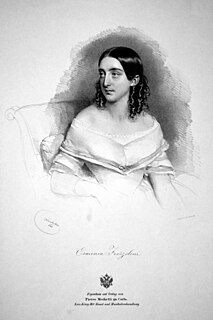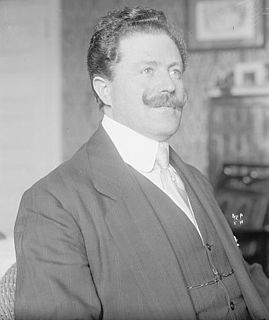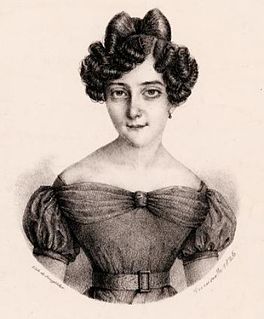Related Research Articles

ZazàItalian pronunciation: [dzadˈdza] is an opera by Ruggero Leoncavallo, with a libretto by the composer. The story concerns the French music hall singer, Zazà, and her affair and subsequent decision to leave her lover, Milio, when she discovers that he is married. The music is influenced by the French music halls where Leoncavallo had spent his early years as a composer.
Dano Raffanti is an Italian tenor, particularly associated with the Italian baroque and bel canto repertory.

Nozze istriane is an opera in three acts by Antonio Smareglia to an Italian libretto by Luigi Illica. It premiered on 28 March 1895 at the Teatro Comunale in Trieste.
Ginevra di Scozia is an opera in two acts by Simon Mayr set to an Italian libretto by Gaetano Rossi based on Antonio Salvi's Ginevra, principessa di Scozia, which in turn was adapted from cantos 5 and 6 of Ludovico Ariosto's Orlando Furioso. Ginevra di Scozia premiered on 21 April 1801 at the Regio Teatro Nuovo in Trieste to celebrate the inauguration of the new theatre. The story is virtually identical to that of Handel's Ariodante which shares the same source for the libretto.

Giuseppina Pasqua was an Italian opera singer who performed throughout Italy and Europe from the late 1860s through the early 1900s. She began her career as a soprano when she was only 13, but later retrained her voice as a mezzo-soprano. She sang in several world premieres, but is most remembered today for having created the role of Mistress Quickly in Giuseppe Verdi's Falstaff. The composer wrote the role specifically for her and dedicated the act 2 aria "Giunta all' albergo" to Pasqua. She was married to the baritone Astorre Giacomelli.
Gaetano Bavagnoli (1879–1933) was an Italian conductor who was particularly known for his work within the field of opera. He was mainly active within Italy's major opera houses during the first third of the 20th century; although he did conduct at important international stages like the Metropolitan Opera in New York City and the Royal Opera House in London as well. He also worked as a voice teacher and was notably the instructor of opera singers Emanuel Kopecky, Lina Pagliughi, and Aureliano Pertile.

Giacomo Vaghi was an Italian opera singer who had an active international career from 1925-1956. Along with Tancredi Pasero and Ezio Pinza, he was one of the leading operatic basses of his generation. He possessed a rich voice with a dark timbre that drew him particular acclaim in the operas of Giuseppe Verdi. He appears on several complete opera recordings made with EMI Classics and Cetra Records.

Erminia Frezzolini was an Italian operatic soprano. She excelled in the coloratura soprano repertoire, drawing particular acclaim in the bel canto operas of Gaetano Donizetti and Vincenzo Bellini. She was married to tenor Antonio Poggi from 1841 to 1846.

Nicola Zerola was an Italian operatic tenor who had an active international career from 1898-1928. He began his career in his native country, but was soon heard in concerts and operas internationally during the first years of the 20th century. In 1908 he relocated to the United States where he was active with important opera companies in New York, Chicago, and Philadelphia up into the late 1920s. Between 1909 and 1911 he recorded 13 issued sides for the Victor Talking Machine Company at their Camden, New Jersey studios. He also made 11 solo recordings and one duet for the Gramophone and Typewriter Company in England in 1910-1911.

L'amore medico is an opera in two acts by composer Ermanno Wolf-Ferrari. Based on Molière's comedy L'Amour médecin, the work uses an Italian language libretto by Enrico Golisciani. It premiered in a German version by Richard Batka on 4 December 1913 at the Hoftheater in Dresden under the title Der Liebhaber als Arzt.
Carlo Broccardi (1886–1953) was an Italian operatic tenor who had an active international career during the first third of the 20th century. He notably sang for the first complete recordings of Giuseppe Verdi's Rigoletto and Giacomo Puccini's Tosca ; both for His Master's Voice. He also made recordings for the Fonografia Nazionale and Kalliope record labels.

Aldo Bertocci was an Italian operatic tenor who sang both comprimario and leading roles in a career spanning the late 1940s to the mid-1970s. He sang in the world premieres of nine 20th century operas, most of them in performances broadcast on the RAI, Italy's national public-service radio. His discography includes live recordings of several rarities such as Mascagni's Silvano and Leoncavallo's Zingari. Bertocci was born in Turin and from 1974 lived in Cassano Valcuvia where he died shortly before his 88th birthday.

Charles Rousselière was French operatic tenor who performed primarily at the Paris Opera, the Opéra de Monte-Carlo, and the Opéra-Comique. He sang in the world premieres of several operas, including the title role in Charpentier's Julien and Giorgio in Mascagni's Amica.

Giovanni Paroli (1856–1920) was an Italian operatic tenor who had an active international performance career for four decades. He is best known for creating several comprimario roles in the world premieres of operas by Catalani, Donizetti, Alberto Franchetti, Mascagni, and Verdi.
Reno Andreini was an Italian operatic tenor who had an active international career from 1902–1924. A specialist in the Italian repertoire, he was frequently heard in the bel canto operas of Bellini, Donizetti, and Rossini, and in the verismo operas of Leoncavallo, Mascagni, and Puccini. He was notably the first singer to make a complete recording of the role of Rodolfo in Puccini's La boheme in 1917. He also recorded duets from La traviata with Maria Galvany and one duet from Massenet's Manon with Riccardo Tegani with the Gramophone Company.
Feliciano Cristoforo Bartolomeo Strepponi was an Italian composer and conductor. He was born in Lodi and died in Trieste at the age of 38. Amongst his compositions were seven operas which had a modest success in their day. The last one, L'Ullà di Bassora, premiered at La Scala in 1831. He was the father and first teacher of the opera singer Giuseppina Strepponi who later became the second wife of Giuseppe Verdi.

Virgilio Lazzari was an Italian operatic bass who had an active international performance career from 1908 to 1953. He had lengthy associations with the Chicago Civic Opera (1918–1932) and the Metropolitan Opera (1933–1950), and frequently performed at the Salzburg Festival during the 1930s. He appeared as a guest artist with opera houses internationally, including the Royal Opera House, the Teatro Colón, and the Teatro Carlo Felice among others.

Maria Carbone was an Italian operatic soprano. She created the lead female roles in two of Gian Francesco Malipiero's operas: the title role in Ecuba and Cleopatra in Antonio e Cleopatra.

Caterina Canzi, also known as Katharina Wallbach-Canzi, was an Austrian-born soprano who sang leading roles in the opera houses of Europe, primarily in Italy and Germany. Amongst the roles she created were Isolde in Lindpaintner's Der Vampyr and the title role in Mercadante's Nitocri.
Maria Cecilia Fusco was an Italian operatic soprano and voice teacher. In a long career, she appeared regularly at La Scala in Milan, and leading opera houses in Italy and abroad. Her broad repertoire included works from early Italian opera to premieres of contemporary opera.
References
- ↑ "HH0123.pdf - Chandos Records" (PDF). Chandos Records. Retrieved 2021-05-29.
- ↑ Casaglia, Gherardo (2005). "Giuseppe Antonicelli" . L'Almanacco di Gherardo Casaglia (in Italian).
- ↑ Metropolitan Opera Archives
- ↑ George Henry Hubert Lascelles Earl of Harewood (1980). Opera, Volume 31. Rolls House Publishing Company.